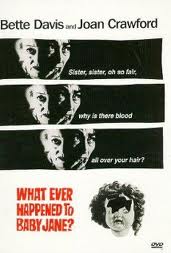
WHATEVER HAPPENED TO BABY JANE?
US, 1962, 133 minutes, Black and white.
Bette Davis, Joan Crawford, Victor Buono, Anna Lee.
Directed by Robert Aldrich.
Whatever Happened to Baby Jane is a most enjoyable film. It was very influential in Hollywood and began a whole trend where ageing actresses turned their attention to potential horror stories. This one is notable as the first and as employing both Bette Davis and Joan Crawford. Bette Davis won an Oscar nomination for her role. It is in the Grand Guignol style: exaggerated performances, highly contrived melodramatic situations, sudden shocks for the audience. The two actresses carry them off particularly well, giving exaggerated performances of their own previous styles.
There are twists in the response from the response from the audience, emotional sympathies veering from one sister to the other. The director was Robert Aldridge who was noted for his strong films with male stars, e.g. The Dirty Dozen, Too Late The Hero, The Emperor Of The North, The Mean Machine etc. However, Aldridge is also very good at directing women and presenting women's themes: this film, its successor, Hush, Hush Sweet Charlotte, The Legend of Lylah Clare, The Killing of Sister George. Altogether an interesting example of what Hollywood can do, and the trends that it can create.
1. How serious was this film? What did the title indicate?
2. What was the chief impact of the film, as a thriller, horror, human interest? Where did your sympathies lie? Why?
3. The effect of the techniques, black and white photography, the melodramatic use of music, the styles of the photography, e.g. overhead shots, the use of time, the tricks for surprise and anxiety for the audience?
4. Did Bette Davis play Jane as a character or a caricature? What were the best aspects of her performance? Did you like her. Did she seem real? Was she credible as a person? Did you blame her for what she was like? Did the ending change this? who was really to blame for Baby Jane's state - herself, her father, show business, Blanche?
5. Blanche - was she a character or a caricature? How did Joan Crawford's acting contrast with that of Bette Davis? Were you always sympathetic towards Blanche? Did you feel sorry for her, share her fears? Were you shocked at her confession at the end? How evil was she? Was Jane evil? How did the ending illustrate the beginning - the looks on Jane's face and Blanche's face?
6. Edwin - why was he introduced into the film? A caricature? A monstrous kind of person to match Jane? His relationship with his mother? What impression did his mother make? Her effect on him, as a person, as a pianist, as forcing him to investigate Jane?
7. What did the film have to say about the effect of the theatre on child actors? The impact of the prologue, Jane dancing, audience response, the Baby Jane Dolls, Jane's wanting ice cream, Blanche's reaction to her?
8. What did the film have to say about Hollywood. its myths, its money-making and the effect on people's lives? Jane's films? Blanche's success?
9. What insight did the film show into the relationship between Jane and Blanche? Violence, cruelty. truth? Appearances and reality? What details were most effective in illustrating this? How did the relationship change towards the end? The impact of Jane's abducting Blanche and the sequences on the beach? What was the reaction of Jane to the truth. relief not anger? Her buying the ice creams? What relief would this have given to Jane?
10. What did the film show of the nature of madness? Evil? Guilt?
11. Comment on the dramatic effect of Elvira. Audience sympathy with Elvira? Her being murdered?
12. What dramatic effect did Mrs. Bates and her daughter have, her busy-bodying, the reaction of Jane, as some refuge for Blanche?
13. What value is there in making a film like this?